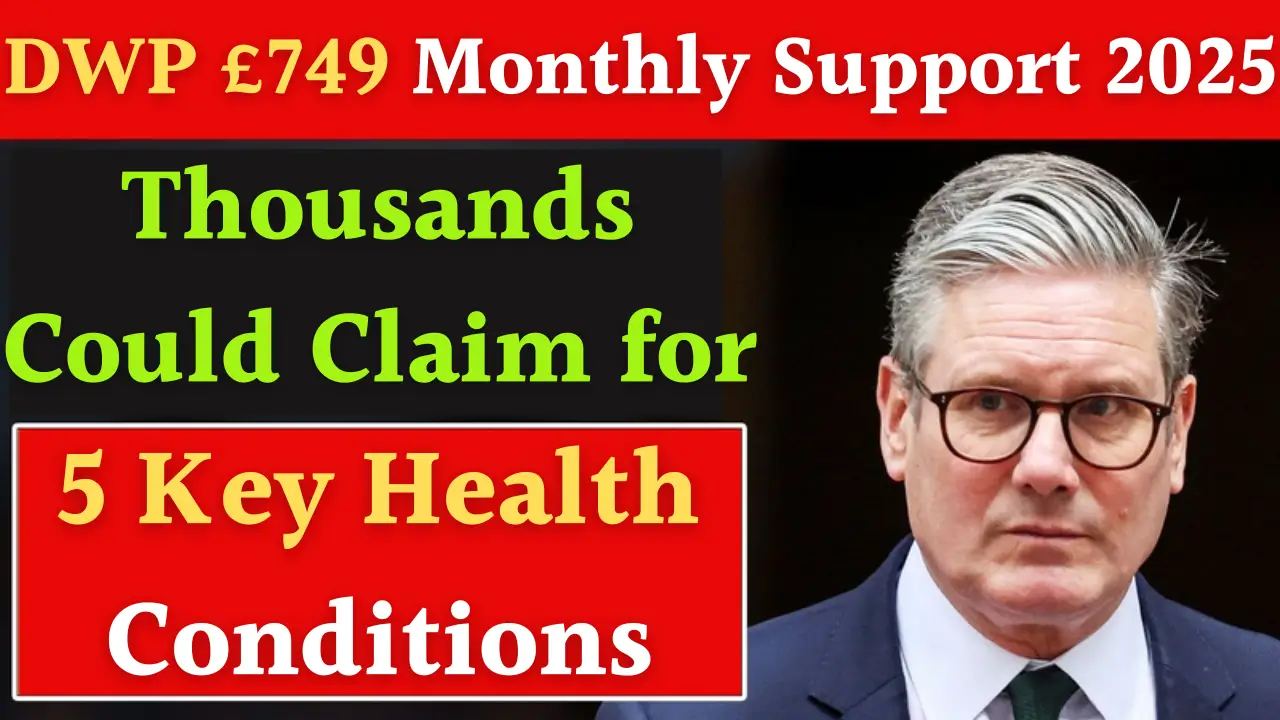The Department for Work and Pensions (DWP) has announced a range of financial support schemes for 2025 that UK residents with long-term health conditions or disabilities may be eligible to receive.
One of the most highlighted allowances in 2025 is the Personal Independence Payment (PIP) and Employment and Support Allowance (ESA), which together with other benefits could provide a monthly support payment of up to £749. This payment is aimed at helping individuals manage the added costs of living with severe or long-term medical conditions.
For many households across the United Kingdom, such financial relief can make a significant difference in managing day-to-day needs, healthcare requirements, and housing expenses. However, it is essential to understand eligibility, qualifying health conditions, and the application process to ensure that those entitled to support do not miss out.
What is the £749 Monthly Support 2025?
The £749 monthly support is not a single benefit, but a financial package made up of disability-related benefits primarily associated with:
- Personal Independence Payment (PIP)
- Employment and Support Allowance (ESA)
- Universal Credit disability elements
Depending on the severity of the health condition and whether daily living or mobility support is required, claimants may qualify for the maximum PIP rate combined with ESA, which totals nearly £749 per month.
This support is particularly valuable for individuals who cannot work full-time or at all due to their health condition. Claimants may also access additional allowances depending on their circumstances, such as housing benefit or carer’s allowance.
Five Health Conditions Eligible for the £749 Monthly Support
Although there are many conditions that may qualify, there are five key categories of health conditions for which thousands are expected to claim in 2025.
1. Mental Health Disorders
Conditions such as severe depression, anxiety disorders, bipolar disorder, schizophrenia, and PTSD can significantly impact a person’s ability to live independently or maintain employment. Mental health conditions are among the most common grounds for PIP applications in the UK.
2. Neurological Disorders
Diseases like multiple sclerosis (MS), Parkinson’s disease, epilepsy, and motor neurone disease often require extensive support. Neurological illnesses are typically long-term and progressive, making individuals reliant on ongoing financial and medical assistance.
3. Cardiovascular Conditions
People with heart failure, chronic angina, or severe hypertension may face difficulties with mobility and daily living activities. Cardiac health problems are a frequent basis for disability claims as they can limit physical stamina and the ability to engage in paid work.
4. Musculoskeletal Conditions
Chronic back pain, arthritis, osteoporosis, and joint disorders can prevent individuals from conducting tasks at both work and home. Such conditions are a significant factor in both ESA and PIP claims, as they reduce physical functioning and independence.
5. Respiratory Illnesses
Chronic obstructive pulmonary disease (COPD), severe asthma, long-Covid-related conditions, and pulmonary fibrosis are all respiratory conditions which diminish mobility and daily functioning. These illnesses often require constant medical attention and are eligible for PIP and ESA financial support.
It is important to note that eligibility is not based solely on the medical diagnosis but also on the level of functional impairment and impact on daily life.
How Much Can You Receive in 2025?
The amount received depends on whether an individual qualifies for standard or enhanced rates under PIP, alongside the ESA amounts. Below is a breakdown:
| Benefit Type | Weekly Rate 2025 | Monthly Equivalent |
|---|---|---|
| PIP Daily Living (Standard) | £72.65 | £290.60 |
| PIP Daily Living (Enhanced) | £108.55 | £434.20 |
| PIP Mobility (Standard) | £28.70 | £114.80 |
| PIP Mobility (Enhanced) | £75.75 | £303.00 |
| ESA (Support Group, maximum) | £129.50 | £518.00 |
A claimant at the highest entitlement could therefore receive around £749 monthly, with the possibility of additional amounts depending on household and carer considerations.
Eligibility Criteria for Claimants
To be eligible, applicants must:
- Be aged 16 or above and under State Pension age.
- Have a long-term health issue or disability expected to last at least 12 months.
- Provide medical evidence showing how the condition affects daily living and mobility.
- Undergo an assessment if required, where a health professional evaluates eligibility.
Individuals over State Pension age may qualify for Attendance Allowance, which is a similar benefit tailored for older adults with care needs.
Application Process for DWP Monthly Support
Applying for the £749 monthly support involves several steps:
- Initial Contact – Claimants must first notify DWP of their intention to claim, either through phone or online registration.
- Application Form – Applicants must complete a detailed questionnaire outlining how their condition impacts their daily life and movement.
- Medical Evidence Submission – Supporting documents from doctors, consultants, or carers strengthen the application.
- Assessment Appointment – Many applicants are required to attend a face-to-face or virtual assessment.
- Decision Letter – Based on the review, DWP will confirm whether the application is successful and state the awarded benefit level.
It is essential to appeal promptly if a claimant feels the decision is incorrect. Thousands of successful appeals each year show that persistence leads to positive outcomes for many applicants.
Why the Support is Crucial in 2025
With the rising cost of living, inflation, and increased healthcare expenses, monthly support from the DWP has become more important than ever for households across the UK. Energy costs and food prices continue to strain vulnerable families. The £749 support provides not only a financial cushion but also a recognition of the additional challenges faced by those with health conditions.
Beyond financial help, these benefits also improve access to social care, support for mobility aids, transport costs, and specialised treatments. This ensures that individuals remain active, independent, and less burdened by financial hardship.
The Impact on Thousands of UK Households
The DWP’s monthly support affects hundreds of thousands across the UK each year. In 2025, a significant increase is expected in claimants, particularly among those suffering from post-pandemic long-term health conditions such as long Covid. Awareness campaigns have also made more people recognise that they may be eligible.
For families that support individuals with disabilities, the benefit is equally beneficial by reducing the financial pressure of caring responsibilities. The monthly support can make the difference between struggling and maintaining a stable living standard.
FAQs
1. What is the highest monthly support I can get from DWP in 2025?
You may receive up to around £749 per month if you qualify for the enhanced rate of PIP combined with ESA.
2. Do mental health conditions qualify for DWP monthly support?
Yes, mental health conditions such as depression, bipolar disorder, and anxiety disorders can qualify if they severely impact daily living or mobility.
3. Can I apply for this support if I am over State Pension age?
Those over State Pension age cannot claim PIP but may be eligible for Attendance Allowance instead.
4. How long does it take for a claim to be processed?
On average, it can take 12 to 16 weeks from the application date to receive a decision, depending on assessment requirements.
5. Do I need medical proof to qualify?
Yes, providing medical records, consultant letters, and other supporting documentation is important to demonstrate the impact of your condition.
Conclusion
The DWP £749 Monthly Support 2025 represents a vital financial lifeline for thousands of people dealing with long-term illnesses or disabilities in the UK. By recognising five major categories of qualifying health conditions—mental health, neurological disorders, cardiovascular problems, musculoskeletal issues, and respiratory illnesses—the scheme ensures financial assistance reaches those most in need.
Claimants who meet the eligibility standards could secure up to £749 per month, relieving financial pressure and improving daily quality of life. For those struggling with severe health conditions, it is essential to explore this support and apply to avoid missing out on crucial benefits.



















